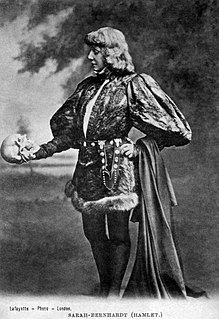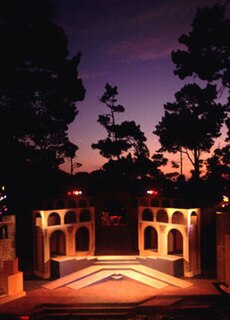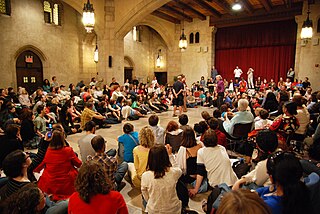
Acting is an activity in which a story is told by means of its enactment by an actor or actress who adopts a character—in theatre, television, film, radio, or any other medium that makes use of the mimetic mode.

Improvisational theatre, often called improvisation or improv, is the form of theatre, often comedy, in which most or all of what is performed is unplanned or unscripted: created spontaneously by the performers. In its purest form, the dialogue, action, story, and characters are created collaboratively by the players as the improvisation unfolds in present time, without use of an already prepared, written script.

Kabuki (歌舞伎) is a classical form of Japanese dance-drama. Kabuki theatre is known for its heavily-stylised performances, the often-glamorous costumes worn by performers, and for the elaborate kumadori make-up worn by some of its performers.

The following outline is provided as an overview of and topical guide to theatre:

A theatre director or stage director is a professional in the theatre field who oversees and orchestrates the mounting of a theatre production such as a play, opera, dance, drama, musical theatre performance, etc. by unifying various endeavors and aspects of production. The director's function is to ensure the quality and completeness of theatre production and to lead the members of the creative team into realizing their artistic vision for it. The director thereby collaborates with a team of creative individuals and other staff to coordinate research and work on all the aspects of the production which includes the Technical and the Performance aspects. The technical aspects include: stagecraft, costume design, theatrical properties (props), lighting design, set design, and sound design for the production. The performance aspects include: acting, dance, orchestra, chants, and stage combat.

Experimental theatre, inspired largely by Wagner's concept of Gesamtkunstwerk, began in Western theatre in the late 19th century with Alfred Jarry and his Ubu plays as a rejection of both the age in particular and, in general, the dominant ways of writing and producing plays. The term has shifted over time as the mainstream theatre world has adopted many forms that were once considered radical.
A closet drama is a play that is not intended to be performed onstage, but read by a solitary reader or sometimes out loud in a small group. The contrast between closet drama and classic "stage" dramas dates back to the late eighteenth century. Although non-performative in nature, the literary historian Henry A. Beers considers closet drama "a quite legitimate product of literary art."

A theater, theatre or playhouse, is a structure where theatrical works, performing arts and musical concerts are presented. The theater building serves to define the performance and audience spaces. The facility usually is organized to provide support areas for performers, the technical crew and the audience members, as well as the stage where the performance takes place.

This article is an overview of traditional and modern Japanese theatre. Traditional Japanese theatre is among the oldest theatre traditions in the world. Traditional theatre includes Noh, a spiritual drama, and its comic accompaniment kyōgen; kabuki, a dance and music theatrical tradition; bunraku, puppetry; and yose, a spoken drama. Modern Japanese theatre includes shingeki, shinpa and shōgekijō. In addition, there are many classical western plays and musical adaptations of popular television shows and movies that are produced in Japan.
Theatre for development (TfD) is a type of community-based or interactive theatre practice that aims to promote civic dialogue and engagement.
A dialect coach is an acting coach who helps an actor design the voice and speech of a character in the context of an on-camera, stage, radio or animation voiceover production. The dialect coach often does original research on dialects and speech patterns, prepares training materials, provides instruction and works on lines with the actor. A dialect coach will give the actor feedback focusing on issues of credibility, consistency, and clarity. A dialect coach may also be employed to help comedians hone impressions of celebrities, to train non-actor public speakers in vocal character and delivery, or to help singers improve in diction and attain a balance between tone and articulation, especially when singing in a second language.

The architectural form of theatre in Rome has been linked to later, more well-known examples from the 1st century BC to the 3rd Century AD. The Theatre of ancient Rome referred to as a period of time in which theatrical practice and performance took place in Rome has been linked back even further to the 4th century BC, following the state’s transition from monarchy to republic. Theatre during this era is generally separated into genres of tragedy and comedy, which are represented by a particular style of architecture and stage play, and conveyed to an audience purely as a form of entertainment and control. When it came to the audience, Romans favored entertainment and performance over tragedy and drama, displaying a more modern form of theatre that is still used in contemporary times. 'Spectacle' became an essential part of an everyday Romans expectations when it came to Theatre. Some works by Plautus, Terence, and Seneca the Younger that survive to this day, highlight the different aspects of Roman society and culture at the time, including advancements in Roman literature and theatre. Theatre during this period of time would come to represent an important aspect of Roman society during the republican and imperial periods of Rome.

The Theatre of the Oppressed (TO) describes theatrical forms that the Brazilian theatre practitioner Augusto Boal first elaborated in the 1970s, initially in Brazil and later in Europe. Boal was influenced by the work of the educator and theorist Paulo Freire and his book Pedagogy of the Oppressed. Boal's techniques use theatre as means of promoting social and political change in alignment originally with radical-left politics and later with centre-left ideology. In the Theatre of the Oppressed, the audience becomes active, such that as "spect-actors" they explore, show, analyse and transform the reality in which they are living.
The Lois Cowles Harrison Center for the Visual and Performing Arts is a high school in Lakeland, Florida, United States. The school was founded in 1989 and named after community member and art patron Lois Cowles Harrison. It is a magnet school that draws its student population from communities throughout Polk County. Students may specialize in dance, classical guitar, orchestra, piano, choir, jazz, theatre, technical theatre, musical theatre, film, visual arts, or creative writing. Students take general education classes at Lakeland High School, located adjacent to Harrison School for the Arts. The school received an expansion in 2008, with renovations and the addition of 95,000 square feet to the building.
The Kentucky Governor's School for the Arts (GSA) is a three-week summer program for rising juniors and seniors in the state of Kentucky. Each spring over 1700 students audition for 256 spots in the program. The program is located at the University of Kentucky in Lexington, KY. The program is free for students to attend, and most universities in the state, and several in other states, offer scholarships to GSA alumni. The 256 selected applicants are divided into nine different art forms (disciplines), which means that an average of about 28 students throughout the state are selected for each discipline, emphasizing the selectivity of the program's recruitment of prospective young artists.

The New York State Summer School of the Arts (NYSSSA) is a series of summer residential programs for New York State high school students. It provides intensive pre-professional training. It is open to all New York State high school age students who qualify through audition. Seven component schools offer training in the specific disciplines of ballet, choral studies, dance, media arts, orchestral studies, theatre and visual arts.

An audition is a sample performance by an actor, singer, musician, dancer or other performer. It typically involves the performer displaying their talent through a previously memorized and rehearsed solo piece or by performing a work or piece given to the performer at the audition or shortly before. In some cases, such as with a model or acrobat, the individual may be asked to demonstrate a range of professional skills. Actors may be asked to present a monologue. Singers will perform a song in a popular music context or an aria in a Classical context. A dancer will present a routine in a specific style, such as ballet, tap dance or hip-hop, or show his or her ability to quickly learn a choreographed dance piece.

An actor or actress is a person who portrays a character in a performance. The actor performs "in the flesh" in the traditional medium of the theatre or in modern media such as film, radio, and television. The analogous Greek term is ὑποκριτής (hupokritḗs), literally "one who answers". The actor's interpretation of a role—the art of acting—pertains to the role played, whether based on a real person or fictional character. This can also be considered an "actor's role," which was called this due to scrolls being used in the theaters. Interpretation occurs even when the actor is "playing themselves", as in some forms of experimental performance art.
A stage reading, also known as a staged reading, is a form of theatre without sets or full costumes. The actors, who read from scripts, may be seated, stand in fixed positions, or incorporate minimal stage movement.
Avatar Repertory Theater commonly known as ART, is a theatre troupe that performs primarily in the virtual world Second Life, though they have recently extended to other virtual platforms such as OSGrid and Kitely.













